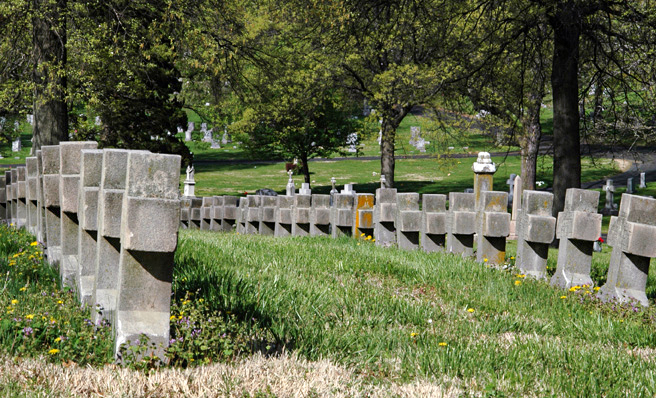Occasionally, we work with a church that has its private cemetery dedicated on its property and is looking to sell. Although not always the case, these cemeteries usually consist of cremated remains.

Public vs. Private:
Most people know a cemetery when they see one, but the California Health and Safety Code defines a Cemetery as either of the following:
- Any of the following that is used or intended to be used and dedicated for cemetery purposes:
A. A burial park, for earth interments.
B. A mausoleum, for crypt or vault interments.
C. A crematory and columbarium, for interment of cremated remains or hydrolyzed human remains. - A place where six or more human bodies are buried.
- Cemeteries may be public in that they are owned and operated by a city, county, city, and county, or public cemetery district for use by the general public or private in that restrictions are placed on who may be interned there.
Ownership Transfers:
When transferring ownership of a private cemetery, fifty percent or more, the Cemetery and Funeral Bureau in the Department of Consumer Affairs must be notified and provided with the name and address of the new owner and identify the principal offices of the cemetery authority. This same information must be published in a newspaper of general circulation in the county in which the cemetery is located. Additionally, the new owner must obtain a new certificate of authority from the Cemetery and Funeral Bureau.
Removal of Remains:
Upon proper notice, after the expiration of ten months, any cemetery authority may cause the removal of all human remains interred in the cemetery and may reinter such remains in other cemeteries in California where interments are permitted. The remains of each person reinterred shall be placed in a separate and suitable receptacle and decently and respectfully interred under rules and regulations adopted by the cemetery authority making the removal.
Removal of Dedication:
Property dedicated to cemetery purposes shall be held and used exclusively for cemetery purposes, unless and until the dedication is removed from all or any part of it by an order and decree of the superior court of the county in which the property is situated, in a proceeding brought by the cemetery authority for that purpose and upon notice of hearing and proof satisfactory to the court:
(a) That no interments were made in or that all interments have been removed from that portion of the property from which dedication is sought to be removed.
(b) That the portion of the property from which dedication is sought to be removed is not being used for the interment of human remains.
After the removal of all human remains interred in any part or the whole of the cemetery lands, the cemetery authority may file for record in the office of the county recorder of the county or city and county in which the lands are situated a written declaration reciting that all human remains have been removed from the lands described in the declaration.
California Cemetery and Funeral Bureau:
“The California Department of Consumer Affairs, Cemetery and Funeral Bureau (Bureau) licenses, regulates, and investigates complaints against 13 different licensing categories in California, totaling approximately 13,500 licensees. The licensing categories include funeral establishments, funeral directors, embalmers, apprentice embalmers, cemetery brokers/branch/additional, cemetery salespersons, cremated remains disposers, crematories, crematory managers, cemetery managers, and the nearly 200 licensed private cemeteries in the State.
(NOTE: The State does not license cemeteries operated by religious organizations; cities, counties, or cemetery districts; the military; Native American tribal organizations; or other groups. If you don’t know who regulates the cemetery you’re interested in, ask the cemetery manager.)” California Department of Consumer Affairs, Cemetery and Funeral Bureau, https://www.cfb.ca.gov/about_us/who.shtml
Please see our other related articles
Selling Church Property
Why Use Bushore Real Estate
Church Officer and Director Liability
Disclaimer: Every situation is different and particular facts may vary thereby changing or altering a possible course of action or conclusion. The information contained herein is intended to be general in nature as laws vary between federal, state, counties, and municipalities and therefore may not apply to any given matter. This information is not intended to be legal advice or relied upon as a legal opinion, course of action, accounting, tax, or other professional services. You should consult the proper legal or professional advisor knowledgeable in the area that pertains to your particular situation.
